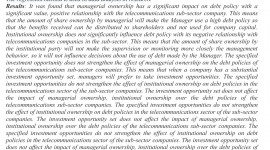Publication
The Role Of Investment Opportunities In The Influence Of Ownership Structure And Corporate Debt Policy
- By Dr. SAMSURIJAL. HS S.P, M.M
- 31 Jul 2021

The Role Of Investment Opportunities In The Influence Of Ownership Structure And Corporate Debt Policy
Objective: The purpose of this study is to determine the effect of managerial stock ownership, the impact of institutional stock ownership, on debt policies that are moderated by investment opportunities.
Methodology: This research method is quantitative and causal associative. The regression method is used in data analysis in research.
Results: It was found that managerial ownership has a significant impact on debt policy with a significant value, positive relationship with the telecommunications sub-sector company. This means that the amount of share ownership by managerial will make the Manager use a high debt policy so that the benefits received can be distributed to shareholders and not used for company capital. Institutional ownership does not significantly influence debt policy with its negative relationship with telecommunications companies in the sub-sector. This means that the amount of share ownership by the institutional party will not make the supervision or monitoring more closely the management behavior, so it will not influence decisions about the use of debt made by the Manager. The specified investment opportunity does not strengthen the effect of managerial ownership on the debt policies of the telecommunications sub-sector companies. This means that when a company has a substantial investment opportunity set, managers will prefer to take investment opportunities. The specified investment opportunities do not strengthen the effect of institutional ownership on debt policies in the telecommunications sector of the sub-sector companies. The investment opportunity set does not affect the impact of managerial ownership, institutional ownership over the debt policies of the telecommunications sub-sector companies. The specified investment opportunities do not strengthen the effect of institutional ownership on debt policies in the telecommunications sector of the sub-sector companies. The investment opportunity set does not affect the impact of managerial ownership, institutional ownership over the debt policies of the telecommunications sub-sector companies. The specified investment opportunities do not strengthen the effect of institutional ownership on debt policies in the telecommunications sector of the sub-sector companies. The investment opportunity set does not affect the impact of managerial ownership, institutional ownership over the debt policies of the telecommunications sub-sector companies.
Implication:The investment opportunity set does not strengthen the effect of managerial ownership on debt policy. This means that when a company has a substantial investment opportunity set, managers will prefer to take investment opportunities. Because by investing, the company will get a profit and will turn around if the company decides to use debt because making a debt decision will make the company have a high risk when the company cannot pay the debt. So the investment opportunity moderation variable outlined in this study cannot strengthen the effect of managerial ownership on debt policy. Managerial ownership has a significant impact on loan policy. This implies that managerial ownership increases profits because company profits are distributed to managers as shareholders. The influence of investment opportunity sets has not been proven to affect institutional ownership on debt policy; this implies that high institutional ownership will not affect the level of loans to be used by the company, which can also involve a higher level of institutional will not make the loan according to the choices needed because the company will prefer to invest.
Keywords: ownership structure, agency, investment opportunity set, debt policy, investment opportunity
